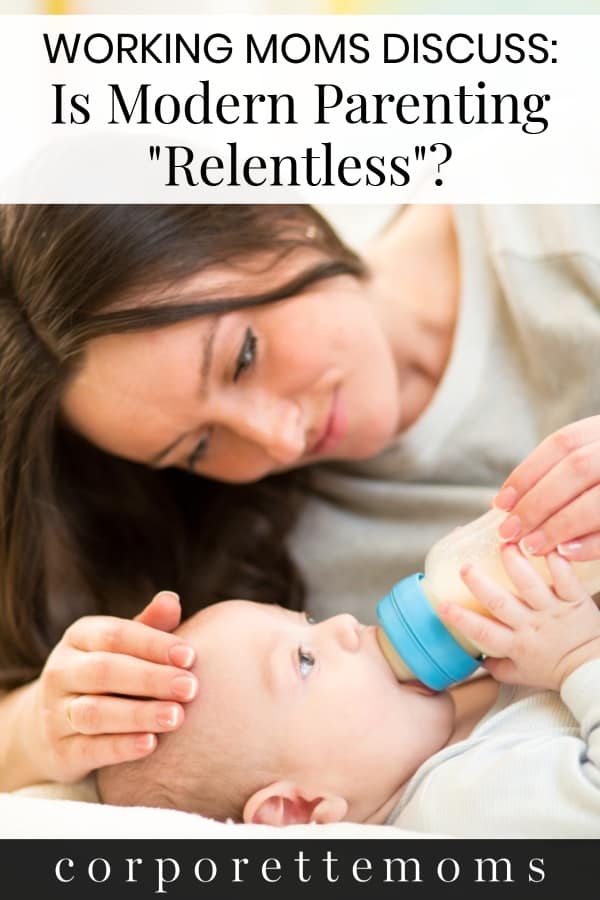Let’s Discuss: The Relentlessness of Modern Parenting
This post may contain affiliate links and CorporetteMoms may earn commissions for purchases made through links in this post. As an Amazon Associate, I earn from qualifying purchases.

The New York Times recently had a story called “The Relentlessness of Modern Parenting” that really struck home. I’ve seen it shared about 15 times on Facebook by friends and others, and I thought it would make a great discussion here. Here’s the subheading: “Raising children has become significantly more time-consuming and expensive, amid a sense that opportunity has grown more elusive.” Yeppppp. Some quotes (with hyperlinks from the original article):
[They quote a professor mom who describes all the different lessons she signed her under-5 kids up for, and then note:] While this kind of intensive parenting — constantly teaching and monitoring children — has been the norm for upper-middle-class parents since the 1990s, new research shows that people across class divides now consider it the best way to raise children, even if they don’t have the resources to enact it.”
They also note that “[m]others who juggle jobs outside the home spend just as much time tending their children as stay-at-home mothers did in the 1970s,” explaining further:
The time parents spend in the presence of their children has not changed much, but parents today spend more of it doing hands-on child care. Time spent on activities like reading to children; doing crafts; taking them to lessons; attending recitals and games; and helping with homework has increased the most.
Today, mothers spend nearly five hours a week on that, compared with 1 hour 45 minutes in 1975 — and they worry it’s not enough. Parents’ leisure time, like exercising or socializing, is much more likely to be spent with their children than it used to be. While fathers have recently increased their time spent with children, mothers still spend significantly more.
Or here’s a fabulous, fabulous quote from one of the moms interviewed: “There’s this sense that something is wrong with you if you aren’t with your children every second when you’re not at work.” Oooof. YES.
I am grateful to have a husband who wants to be very, very involved with the kids and loves to play with them — but as an introvert I find the expectation to “constantly entertain” my kids to be completely overwhelming. I feel guilty if, on weekend days, we only do one craft project, board game, or other super-focused time. (In other words, when I put my phone down for a solid 15 minutes.) I don’t think this is “working mom guilt” — I think this is just mom-mom guilt.
I feel guilty when I know we have 10,000 arts and craft supplies and tools on hand and I can’t find them in the 5-minute window in which my youngest expresses interest in watercolors or a craft project — which makes me feel guilty that I haven’t spent time when the kids aren’t there (like during my working hours!) to research or set up crafts or art projects. I feel guilty when my idea of “mommy time” is trying to sweet-talk one of the kids into running errands with me.
During working hours, I already research local classes the kids could do, and during the summer I have to use Excel charts to keep track of everyone’s camp schedules. It’s only recently that I’ve started not feeling overwhelming guilt if I go for a run during the middle of a weekend day.
I sound like a little crazy to myself. In fact, if a friend were talking like this I would give her a hug and tell her to schedule some self-care. But I’ll bet I’m not alone.
I don’t know what the answer is — I’ve written before (but cannot find it now!) about how I’m strangely, defiantly anti-Martha Stewart in many ways — no Elf on the Shelf for me! I throw away my kids’ artwork (after I lovingly photograph it to include in a family photo album that I, of course, will make, that no one but me will look at)!
My kids wore PJs the entire first year! — but that kind of defiance just feeds right into the Mommy Wars, doesn’t it? After all, it’s one thing for me to choose not to do Elf on the Shelf — but another to roll my eyes at the moms who do, ultimately because I worry that that they make me look bad. (I know, I know — just keep repeating Amy Poehler’s famous quote to yourself: Good for you, not for me!”)
What are your thoughts, ladies? Do you feel like there’s a relentlessness to modern parenting — and how do you deal with it as a working mom? (Side question — I know my husband feels the stress — how do your partners feel about this?)
Stock photo via Shutterstock / Oksana Kuzmina.



I think part of why modern parenting is so hard is because we are so much busier. Now we get to be the homemakers and the workers. Yay. Except we don’t get more time to do it in! Plus, there is information overload with nonstop choices of programming at our fingertips where ever we are. We could always be doing more. We are always missing out and the busier you get the more you feel that way. Plus, so much our our security is slipping away. People used to work one job their whole lives and marry one time. Now, you can’t count on either of those like you used to.
After reading this article I picked up Forget Having It All: How America Messed Up Motherhood and How to Fix It. Highly recommended.
The concept that we are expected to work as though we were not mothers and mother as though we do not work hugely resonates with me. Personally, I think technology has made this worse. I find the idea that “flex time” is somehow a solution to working motherhood to be particularly insidious. Women should basically be working or mothering all the time in America.
No one wants to peep out their husbands, but at some point the fellas are going to need to step up their parenting/home management game. The system we have now is not working and it’s not sustainable.
I’m probably going to get flamed for saying this, or come across as a selfish monster, but I don’t care about all the blah blah blah about giving my child the best possible opportunities. I actually almost didn’t have a kid at all because I couldn’t face the reality of modern American parenting expectations. The whole system is deranged. The fact that I have to think about the “ramifications” of letting my child quit ballet at age 4 is absurd. I also care about my own life and my own happiness. And I am okay being called selfish if it means I get to spend time with my friends and doing hobbies I want to do. I just want to still know who I am as a person when I have an empty nest. I don’t want to feel complete devastation at my now totally empty life that was only filled by obsessing over my child 24/7 for the previous 18 years.
That said, I don’t need The Best for myself or my child. I’m okay with my kid going to non fancy state school in my podunk southern state. I graduated from a fancy and extremely expensive highly ranked private college and it did jack squat for me compared to the connections I made at the non-flagship state school I went to to get my extra accounting and business hours to sit for the CPA exam. My husband also graduated from the fancy private college and it did jack squat for him compared to the connections he made AT COMMUNITY COLLEGE (I’m not even joking). He’s now making six figures and has a half a million dollar stock portfolio thanks to the job he was immediately funneled into after completing his two year tech degree.
There are other avenues to success beyond absolutely killing yourself and your children. I’m okay with us all being average. Some people aren’t… it’s scary and we’re all doing the best we can. I’m also fully aware that I may eat every single one of my words in about 10 years.
Can anyone explain how swim diapers work for babies (specifically, 9 month old)? I went to order online and it seems a lot more confusing than I was expecting! Thanks!
Agree that they’ve sort of missed the mark with this article. I’m in a HCOL area, where a child getting to come straight home after school, not be in a camp in the summer, etc. is a PRIVILEGE, because it means you can either afford a nanny or just have one working adult in your household.
i built a crazy resume in high school and went to an ivy. but i spent most of my younger childhood playing by myself/ bored. my ideal for my kids would be to leave school early and play at home and to have weeks at home in the summer to go to the park and be a little bored. but we dont do that (yet) because it would involve hiring a private babysitter/nanny which is much more expensive than daycare/camps. i think that this article completely missed the point that activities are often considerably cheaper than downtime for working parents.